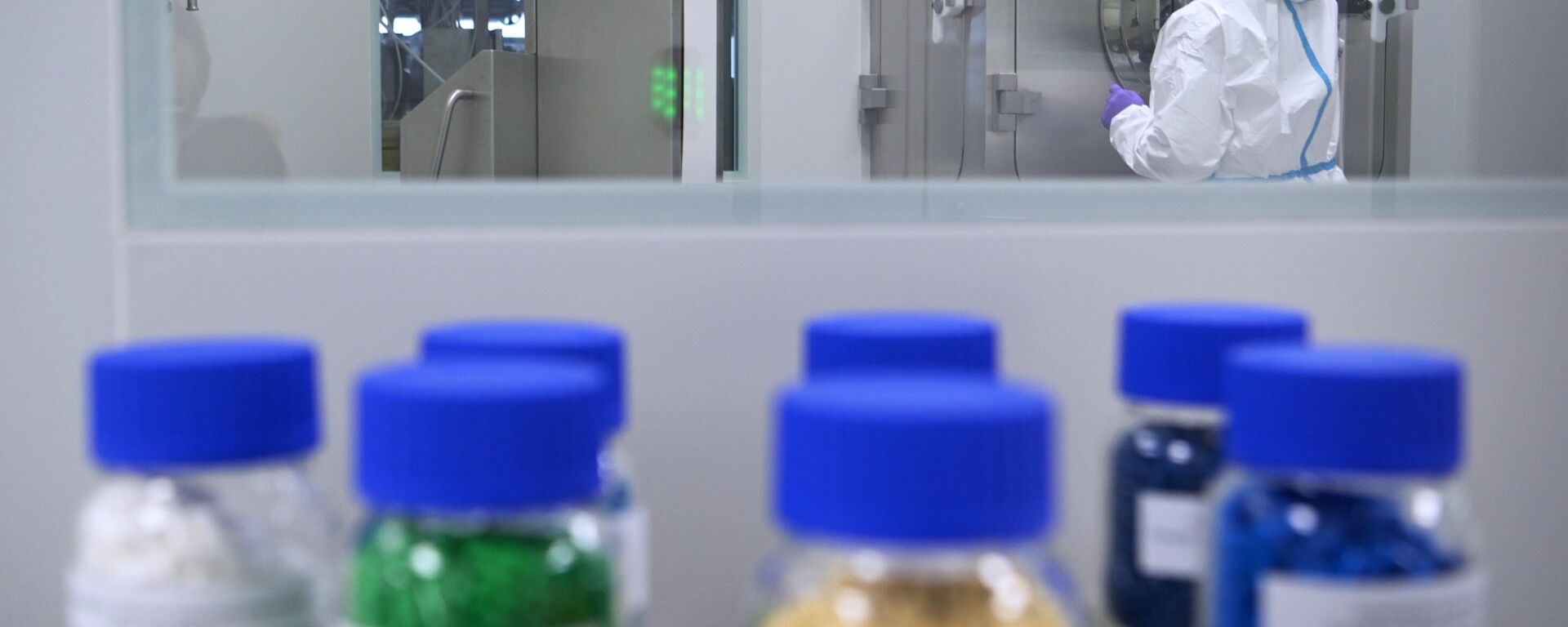https://sputnikglobe.com/20241015/russian-scientists-develop-perfect-molecules-for-pharmacology-1120557778.html
Russian Scientists Develop ‘Perfect’ Molecules for Pharmacology
Russian Scientists Develop ‘Perfect’ Molecules for Pharmacology
Sputnik International
Researchers from UrFU, in collaboration with a scientific team, developed and experimentally tested a new method for producing synthetic analogs of nucleosides that play key roles in living cells.
2024-10-15T09:16+0000
2024-10-15T09:16+0000
2024-10-15T09:16+0000
russia
russia
ural federal university
russian academy of sciences (ras)
scientists
scientific study
https://cdn1.img.sputnikglobe.com/img/07e8/0a/0f/1120557620_0:160:3072:1888_1920x0_80_0_0_d7d816f6a03716ecfaaf2122bcb3060b.jpg
According to the researchers, their synthesis method could be used in pharmacology, as these nucleoside analogs exhibit antiviral, anticancer, anti-inflammatory, and analgesic properties. The results were published in the European Journal of Organic Chemistry.One of the study’s authors, Konstantin Savateev, an associate professor at the Scientific-Educational and Innovation Center of Chemical-Pharmaceutical Technologies at UrFU, explained that synthetic nucleoside analogs are crucial in pharmacology due to their close resemblance to naturally occurring compounds. This structural similarity allows the artificial molecules to «trick» viruses or cancer cells, integrating into their biological processes. This disrupts vital energy and informational functions in pathogens, leading to their degradation and death.According to Savateev, the most common method of synthesizing artificial nucleosides is through ribosylation of purines. However, this process often produces not only the desired N9-isomer but also an unwanted N7-isomer. Isomers have the same chemical composition but different structures, which results in distinct physical, chemical, and biological properties. This requires the final product to be purified.The UrFU scientists, in collaboration with colleagues from the I.Ya. Postovsky Institute of Organic Synthesis of the Russian Academy of Sciences, discovered and experimentally implemented a synthesis method that produces only the «correct» molecules of the desired product.He further noted that the absence of by-products is achieved through a reconstructive synthesis method, fundamentally different from traditional approaches, eliminating the need for purine base ribosylation. «In numerous experiments, the yield of the target product exceeded 80%, which is an excellent result for further implementation of a more efficient synthesis scheme,» said Savateev. This work was supported by the Russian Science Foundation.
https://sputnikglobe.com/20241009/russian-scientists-dish-up-post-op-nutrition-solution-to-help-cancer-patients-recover-1120470023.html
russia
2024
News
en_EN
https://cdn1.img.sputnikglobe.com/img/07e8/0a/0f/1120557620_171:0:2902:2048_1920x0_80_0_0_d2fe677a08ed5a15e5da61c1e088b474.jpg
russian scientists, ural federal university, producing synthetic analogs, natural molecules
russian scientists, ural federal university, producing synthetic analogs, natural molecules
Researchers from Ural Federal University (UrFU), in collaboration with a scientific team, have developed and experimentally tested a new method for producing synthetic analogs of natural molecules (nucleosides) that play key roles in living cells.
One of the study’s authors, Konstantin Savateev, an associate professor at the Scientific-Educational and Innovation Center of Chemical-Pharmaceutical Technologies at UrFU, explained that synthetic nucleoside analogs are crucial in pharmacology due to their close resemblance to naturally occurring compounds. This structural similarity allows the artificial molecules to «trick» viruses or cancer cells, integrating into their biological processes. This disrupts vital energy and informational functions in pathogens, leading to their degradation and death.
Medications containing synthetic analogs of natural nucleosides have been used in medicine for decades. For instance, a drug for treating herpes and chickenpox, which is a complete analog of the natural DNA nucleoside – guanosine – was created in 1974.
According to Savateev, the most common method of synthesizing artificial nucleosides is through ribosylation of purines. However, this process often produces not only the desired N9-isomer but also an unwanted N7-isomer. Isomers have the same chemical composition but different structures, which results in distinct physical, chemical, and biological properties. This requires the final product to be purified.
«Our synthesis process for nucleoside analogs is like the metamorphosis of an insect: after all the internal biochemical changes, which lead to only one outcome, a butterfly emerges from the cocoon,» Savateev explained.
He further noted that the absence of by-products is achieved through a reconstructive synthesis method, fundamentally different from traditional approaches, eliminating the need for purine base ribosylation. «In numerous experiments, the yield of the target product exceeded 80%, which is an excellent result for further implementation of a more efficient synthesis scheme,» said Savateev. This work was supported by the Russian Science Foundation.


